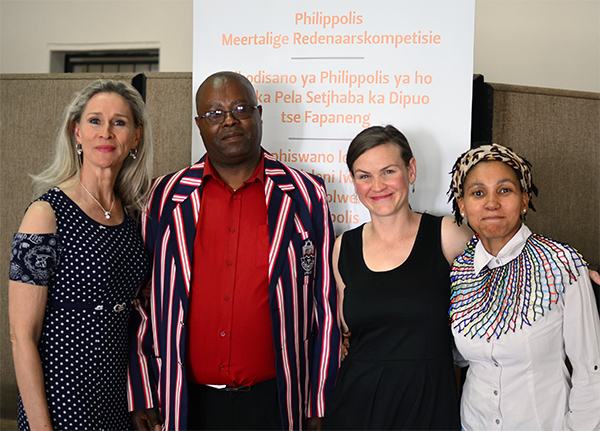Latest News Archive
Please select Category, Year, and then Month to display items
12 January 2024
|
Story Nonsindiswe Qwabe
|
Photo Sonia Small
 Since joining the UFS in 2008, Dr Grey Magaiza has worked extensively on approaches that can foster the socio-economic transformation of societies.
Since joining the UFS in 2008, Dr Grey Magaiza has worked extensively on approaches that can foster the socio-economic transformation of societies.
“The future should be one where communities can decide on their development agenda and futures. That’s the most important for me.” Dr Grey Magaiza, Deputy Director of the Centre for Gender and Africa Studies (CGAS) and Head of the Community Development programme on the Qwaqwa Campus, is passionate about capacitating communities to be agents of change and advancement. His vision for the future emphasises the empowerment of communities to take charge of their development by actively participating in decision making and the implementation of development projects that can improve their lives.
Since joining the UFS in 2008, Dr Magaiza has worked extensively on approaches that can foster the socio-economic transformation of societies. Over the years, he has crafted his research speciality into one that he is most proud of – being an interdisciplinary scientist immersed in the development of communities.
“I’m in a fortunate position of researching what I like. I say ‘fortunate’, because I’ve taken the time to understand what I’m passionate about, which is the overall field of rural livelihoods and livelihood futures – in short, community development. My research starts from an engaged university, understanding the elements that a university must use to enhance transformation and relevance to its immediate community in terms of development.”
One of the ways he has done this is by looking at social entrepreneurship as a development approach for young people in a rural setting. Through workshops with non-profit and civic organisations in Qwaqwa, Dr Magaiza has been helping these organisations to map out their needs and actively meet them through the involvement and support of external role players.
“We understand that communities are part of the national development agenda, but even that national agenda respects community knowledge and intentions and allows communities to shape their identity. A critical enabler of this is community organising. You bring back the capacity in communities to have dialogues on issues affecting them as spaces for engagement, knowledge exchange, and for people to just talk about their way forward.”
By enabling communities to define their development agenda, they can address their specific needs, challenges, and aspirations, he said. “When I look at livelihood futures, it’s quite an exciting aspect of my work – it’s like looking into a fortune tellers’ globe, because you’re not deciding for communities what they should do, but the communities themselves take those decisions.”
Competition emphasises value of mother-tongue education
2017-11-02

At the recent Multilingual Debating Competition were, from the left: Anita Muller,
local facilitator; William Magwa, master of ceremonies; Dr Chrismi-Rinda Loth,
project coordinator in the Unit for Language Facilitation and Empowerment; and
Mabatho Ntsieng, project facilitator in Community Engagement.
Photo: Supplied
The Multilingual Public Speaking Competition has been an annual event in Philippolis since 2013. The competition was established as a result of the Multilingual Information Development Programme (MIDP), a project sponsored by the province of Antwerp in Flanders, Belgium.
The competition is jointly hosted by the Unit for Language Facilitation and Empowerment (ULFE) at the University of the Free State (UFS) and the Department of Community Engagement, also from the UFS.
Debating in your home language
Grade 6 to 9 learners from four schools participated in this year’s competition. Bergmanshoogte Intermediate School, Madikgetla Primary School, Williamsville Primary School, and Springfontein Primary School each entered their three best speakers per grade.
Olerato Tshiloane, a Grade 7 learner from Madikgetla Primary School, was named best speaker overall.
Everyone debated on ‘Heritage’
The overall theme of this annual event was ‘Heritage’. Thirty six learners debated in their mother tongue on aspects of this theme, such as its definition, the role it plays in their lives, and the importance thereof. According to Dr Chrismi-Rinda Loth from ULFE, learners have to present their speeches in their mother tongues. “This emphasises the value of the mother tongue/home language within a teaching context,” she says.
This year’s competition saw 20 Afrikaans speeches, 13 in Sesotho, and three in isiXhosa. The multilingual adjudication panel was composed of teachers from the participating schools, and the head adjudicator from the Afrikaanse Taal- en Kultuurvereniging (ATKV). The ATKV is a partial sponsor of the competition and also provides the participation certificates.
Dr Loth says ULFE and Community Engagement are looking forward to continue their collaboration, thus contributing to the empowerment of the community.